2022年牛津译林版英语中考一轮复习八年级下册Unit4课件(共47张PPT)
文档属性
| 名称 | 2022年牛津译林版英语中考一轮复习八年级下册Unit4课件(共47张PPT) | 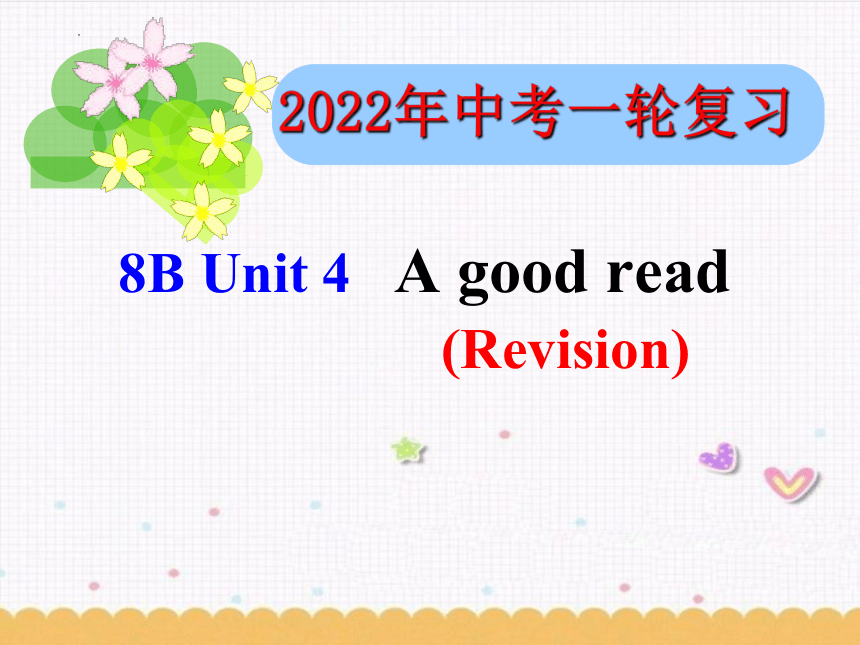 | |
| 格式 | pptx | ||
| 文件大小 | 1.7MB | ||
| 资源类型 | 教案 | ||
| 版本资源 | 牛津译林版 | ||
| 科目 | 英语 | ||
| 更新时间 | 2022-05-05 20:12:23 | ||
图片预览

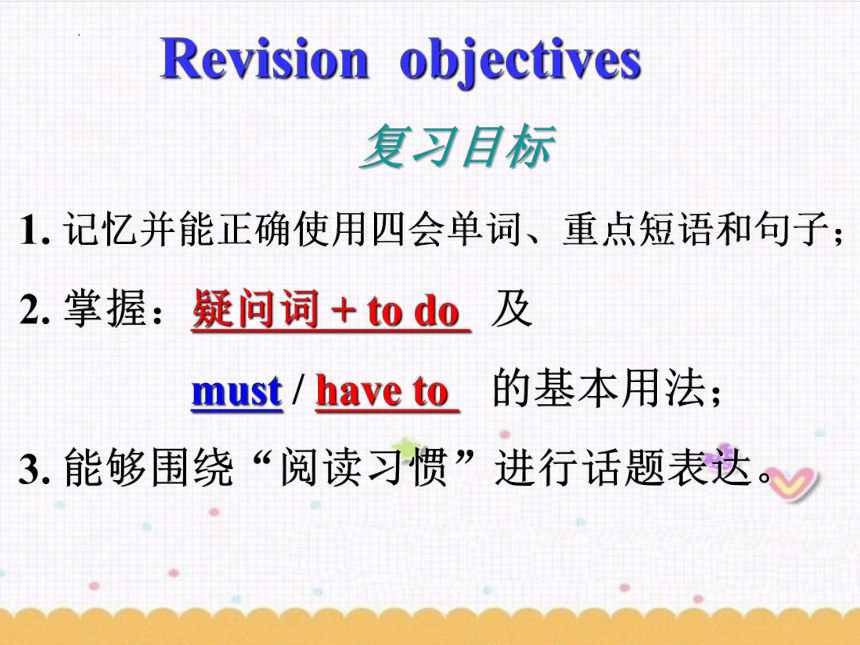
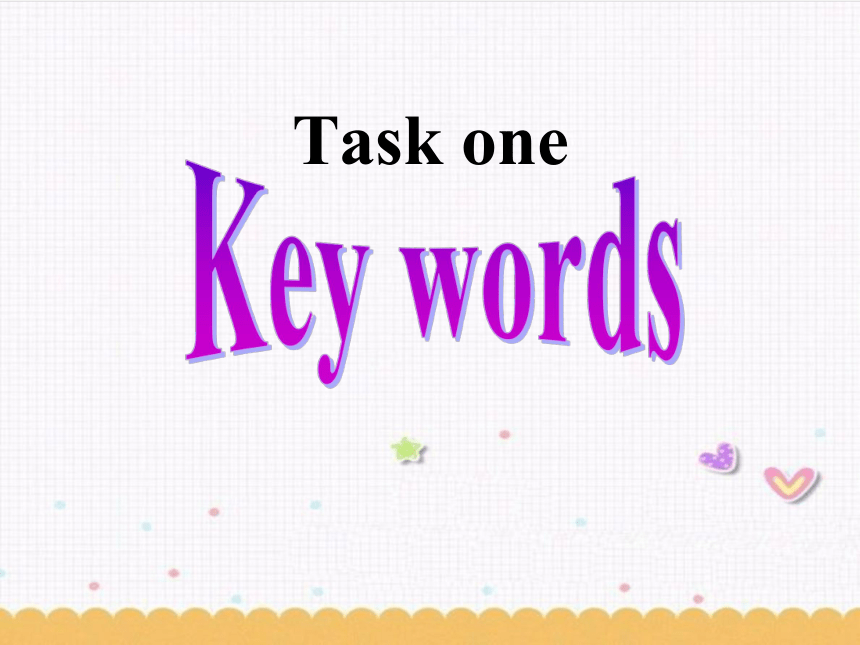
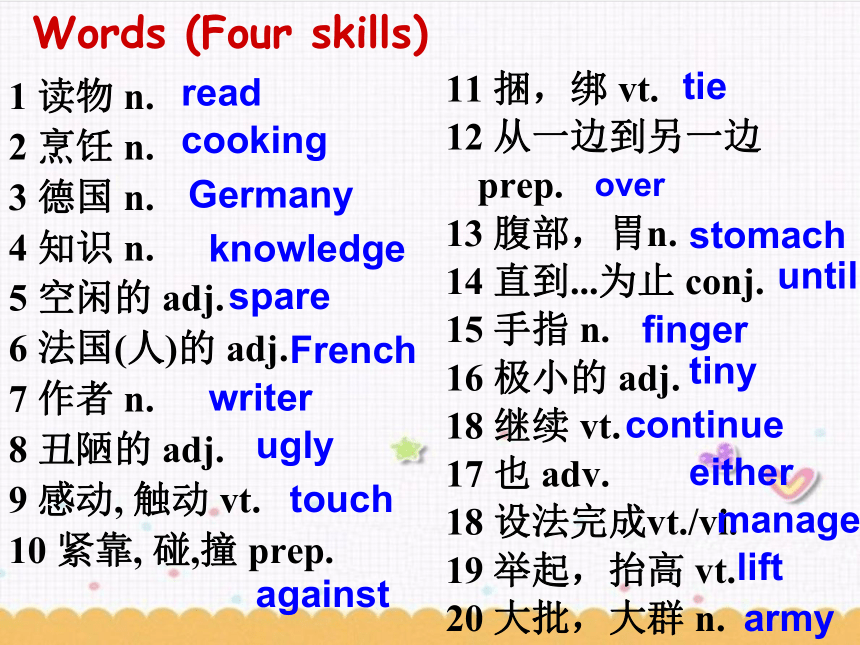
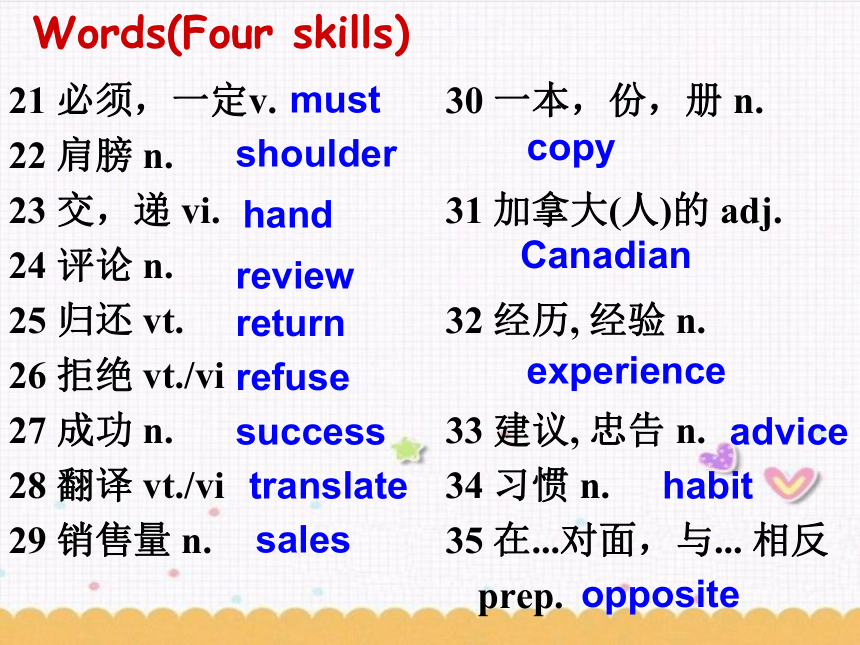
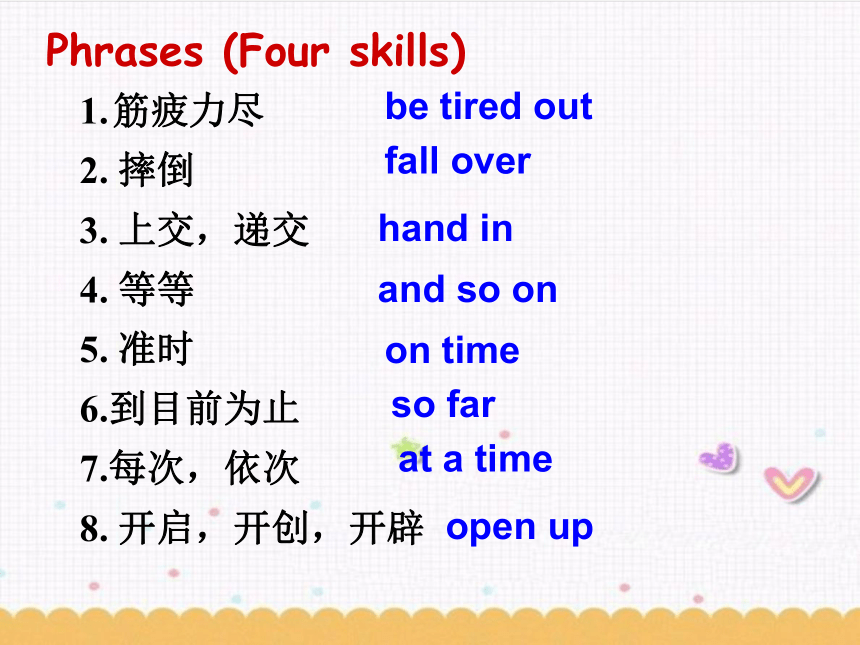
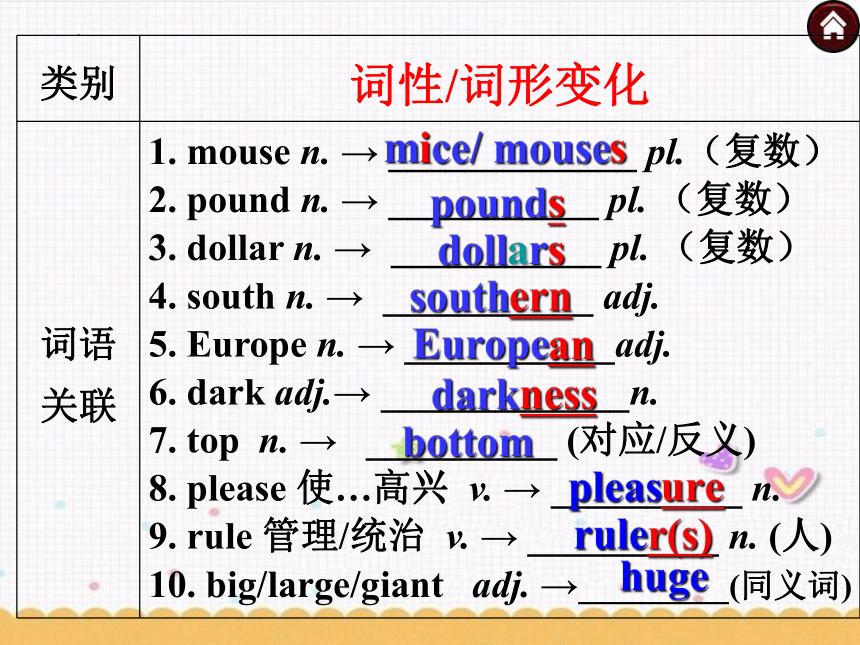
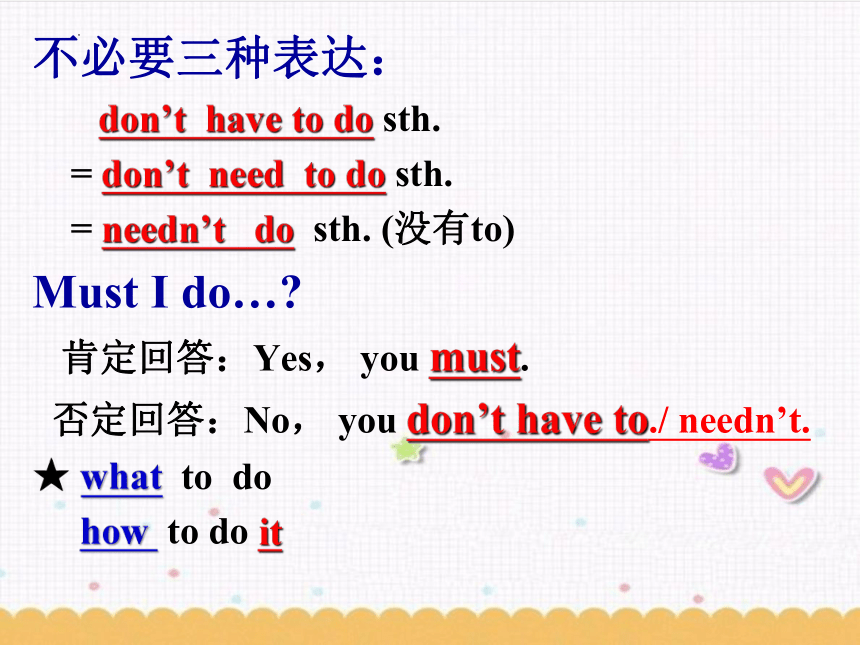
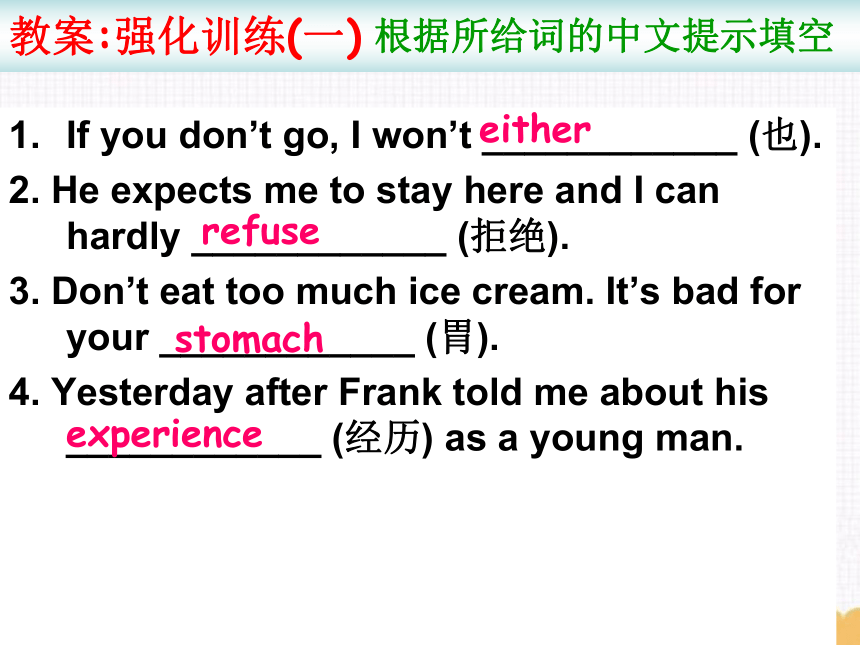
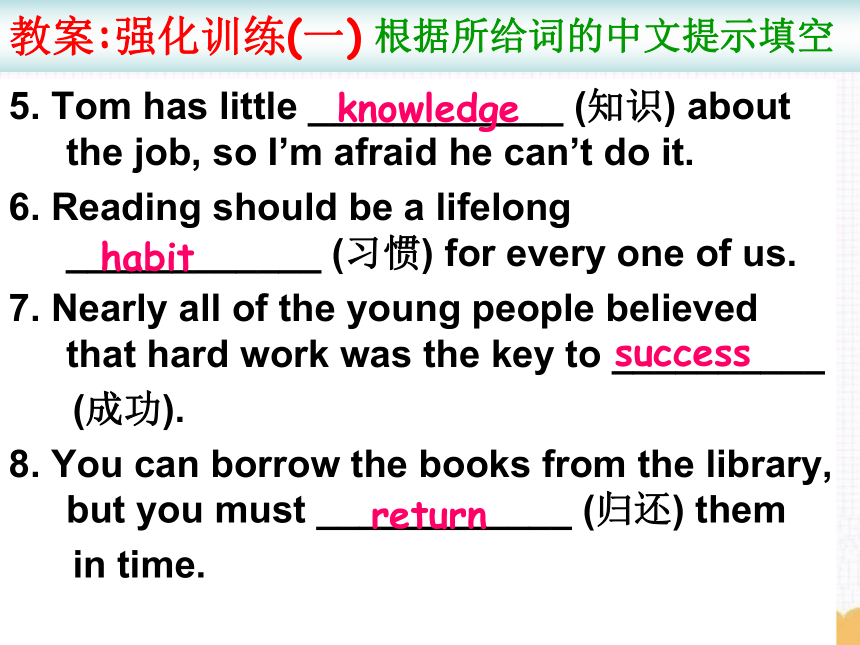
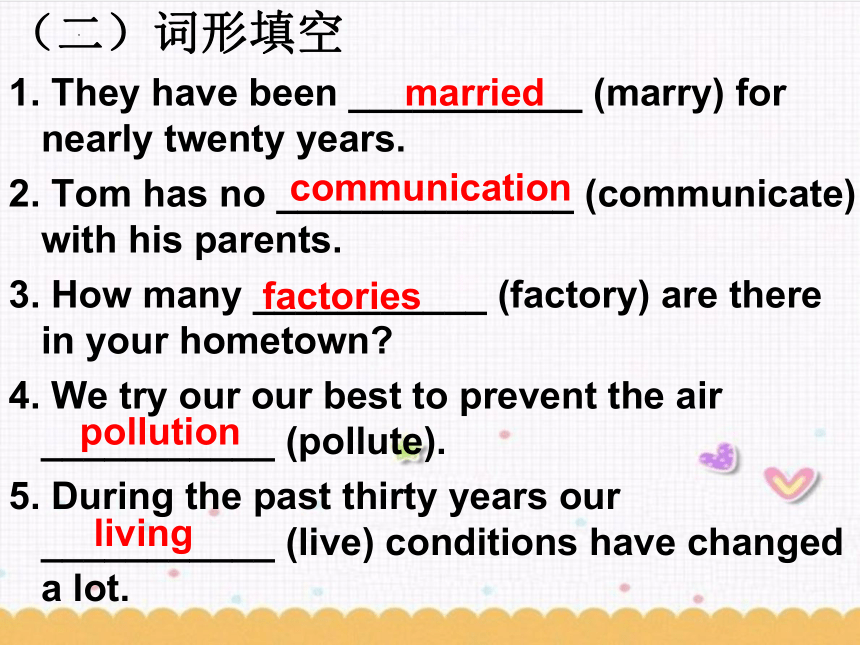
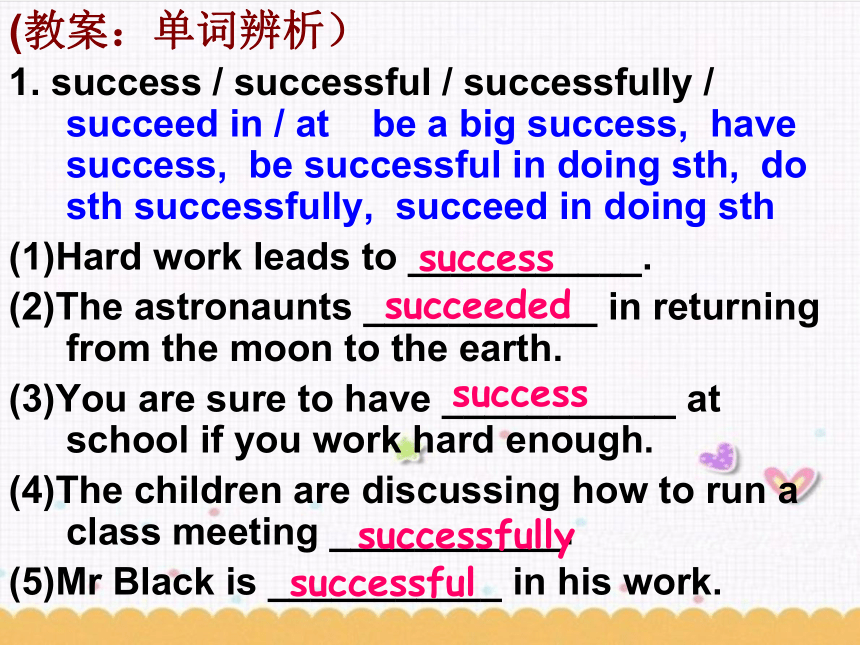
文档简介
(共47张PPT)
2022年中考一轮复习
8B Unit 4 A good read
(Revision)
Revision objectives
复习目标
1. 记忆并能正确使用四会单词、重点短语和句子;
2. 掌握:疑问词 + to do 及
must / have to 的基本用法;
3. 能够围绕“阅读习惯”进行话题表达。
Task one
Key words
11 捆,绑 vt.
12 从一边到另一边 prep.
13 腹部,胃n.
14 直到...为止 conj.
15 手指 n.
16 极小的 adj.
18 继续 vt.
17 也 adv.
18 设法完成vt./vi.
19 举起,抬高 vt.
20 大批,大群 n.
1 读物 n.
2 烹饪 n.
3 德国 n.
4 知识 n.
5 空闲的 adj.
6 法国(人)的 adj.
7 作者 n.
8 丑陋的 adj.
9 感动, 触动 vt.
10 紧靠, 碰,撞 prep.
Words (Four skills)
read
cooking
Germany
knowledge
spare
French
writer
ugly
touch
tie
over
stomach
until
finger
tiny
continue
either
manage
against
lift
army
30 一本,份,册 n.
31 加拿大(人)的 adj.
32 经历, 经验 n.
33 建议, 忠告 n.
34 习惯 n.
35 在...对面,与... 相反prep.
21 必须,一定v.
22 肩膀 n.
23 交,递 vi.
24 评论 n.
25 归还 vt.
26 拒绝 vt./vi
27 成功 n.
28 翻译 vt./vi
29 销售量 n.
Words(Four skills)
must
shoulder
hand
review
return
refuse
success
translate
copy
Canadian
experience
advice
habit
opposite
sales
筋疲力尽
2. 摔倒
3. 上交,递交
4. 等等
5. 准时
6.到目前为止
7.每次,依次
8. 开启,开创,开辟
Phrases (Four skills)
be tired out
fall over
hand in
and so on
on time
so far
at a time
open up
类别 词性/词形变化
词语关联 1. mouse n. → _____________ pl.(复数)
2. pound n. → ___________ pl. (复数)
3. dollar n. → ___________ pl. (复数)
4. south n. → ___________ adj.
5. Europe n. → ___________adj.
6. dark adj.→ _____________n.
7. top n. → __________ (对应/反义)
8. please 使…高兴 v. → __________ n.
9. rule 管理/统治 v. → __________ n. (人)
10. big/large/giant adj. →_________(同义词)
mice/ mouses
pounds
dollars
southern
European
darkness
bottom
pleasure
ruler(s)
huge
不必要三种表达:
don’t have to do sth.
= don’t need to do sth.
= needn’t do sth. (没有to)
Must I do…
肯定回答:Yes, you must.
否定回答:No, you don’t have to./ needn’t.
★ what to do
how to do it
If you don’t go, I won’t ____________ (也).
2. He expects me to stay here and I can hardly ____________ (拒绝).
3. Don’t eat too much ice cream. It’s bad for your ____________ (胃).
4. Yesterday after Frank told me about his ____________ (经历) as a young man.
教案:强化训练(一)
either
根据所给词的中文提示填空
refuse
stomach
experience
5. Tom has little ____________ (知识) about the job, so I’m afraid he can’t do it.
6. Reading should be a lifelong ____________ (习惯) for every one of us.
7. Nearly all of the young people believed that hard work was the key to __________
(成功).
8. You can borrow the books from the library, but you must ____________ (归还) them
in time.
教案:强化训练(一)
根据所给词的中文提示填空
knowledge
habit
success
return
(二)词形填空
1. They have been ___________ (marry) for nearly twenty years.
2. Tom has no ______________ (communicate) with his parents.
3. How many ___________ (factory) are there in your hometown
4. We try our our best to prevent the air ___________ (pollute).
5. During the past thirty years our ___________ (live) conditions have changed a lot.
married
communication
factories
pollution
living
1. success / successful / successfully / succeed in / at be a big success, have success, be successful in doing sth, do sth successfully, succeed in doing sth
(1)Hard work leads to ___________.
(2)The astronaunts ___________ in returning from the moon to the earth.
(3)You are sure to have ___________ at school if you work hard enough.
(4)The children are discussing how to run a class meeting ___________.
(5)Mr Black is ___________ in his work.
(教案:单词辨析)
succeeded
success
success
successfully
successful
2. advice / advise
give sb some valuable advice,
advise doing sth,
advise sb (not) to do sth
(1)Thank you for your useful ___________, I will take it / them.
(2)The doctor _____________ him not to smoke again because of his poor health.
(3)What valuable ____________!
What a valuable ___________.
advice/ suggestions
advises/advised
advice
suggestion
3. spare / space
(1)He is studying French in his ___________ time.
(2)Can you _____ five minutes for me I have something important to tell you.
(3)Could make some ___________ for this old man
spare
spare
space
4. stomach (pl.) ___________
How many ___________ does a cow have
5. against (prep.) 紧靠,碰,撞,反对,违反 do against…, be against…
(1)Put the desk ______________ (紧靠着墙).
(2)Don’t do anything _____________ (违法).
(3)We are going to ___________ (对抗) Class 5 next week.
(4)His parents ___________ (反对) his plan, although he changed it several times.
stomachs
stomachs
against the wall
against the law
play against
were against
6. either / neither
(1)If you don’t go there, I won’t, ___________.
(2)There are many shops on ___________ side of the street.
(3)My parents are busy with their work all day. _________ of them have time with me.
(教案:单词辨析)
either
either
Neither
7. experience (n.) 经验 / 经历 (v.)经历 experienced (adj.)有经验的
(1)He doesn’t have much ___________ in acting.
(2)He had many interesting ___________ while traveling in Africa.
(3)You can ___________ the beauty of nature on the top of the Great Wall.
(4)Miss white is ___________ in teaching.
(教案:单词辨析)
experience
experiences
experience
experienced
Task 2
Important phrases
be interested in
improve the knowledge
be tired out
4. fall down / over
5. the same size as
6. manage to do sth
7. stand on one’s shoulder
8. communicate with…
9. a great success
10. return books on time
1、对……感兴趣
2、提高……知识
3、筋疲力尽
4、跌倒/跌翻
5、与……一样大
6、设法做某事
7、站在某人肩上
8、与……交谈
9、巨大成功
10、按时归还书
11. give sb. a lot of confidence
12. have exciting experiences
13. ask for advice
14. open up
15. the four great classical Chinese novels
16. crash against the rocks
17. be the same size as my little finger
18. a huge army of tiny people
19. at a time
11、给某人很多信心
12、有激动人心的经历
13、寻求建议
14、开启
15、中国的四大名著
16、碰到岩石上
17、和我的小手指一样的大小
18、一大群小人
19、一次
Task 3
Important sentences
1. After our ship crashed against the rocks, I swam ___________________.(尽可能地远)
2. I ___________(倒下)on the beach and went to sleep.
I shouted at them—the loud noise made them all __________.(摔倒)
*fall down强调的是“滑倒,倒下”,后接宾语时应加上介词from。
They boy hit the tree so hard that he _______. The man ____________the ladder and hurt his left leg.
*fall over强调的是“向前摔倒、跌倒”
She ____________and broke her arm.
as far as I could
fell down
fall over
fell down from
fell down
fell over
3. It moved up over my stomach and neck until it was standing near my face.
until 用于肯定句时,主句的谓语动词只能是延续性的,意为“到……为止”;
until用于否定句时,主句的谓语动词只能是短暂性的,意为“直到……才”。
He will be working until 5 o’clock.
I won’t stop shouting until you let me go.
4. I tried to pull one hand free and finally managed to break the ropes.
try to do sth. 表示“设法、试着做某事” 结果不得而知;manage to do sth. 表示“设法完成某件比较困难的事情”,而且确实完成了,相当于succeed in doing sth.
I tried_______ ( save) him, but failed.
I managed ________ (save) him.
to save
to save
6. At first, all the British publishing houses refused to publish it.
*refuse 意为“拒绝,回绝”,其后可以接名词,代词或动词不定式作宾语。
He refused ________(let) me use his bike.
= He didn’t allow me _______(use ) his bike.
7. You can _______________ (搜索) information on the computer here.
to let
to use
search for
search和search for 都有“搜寻,搜索”的意思,但search后面接的这个动作发生的地点,而search for后面接的是进行这个动作的目的。
He searched his pockets, but found nothing. We searched for the little girl in the forest.
8. They also open up a whole new world to me.
open up 打开,开辟
They decided ______________(开辟 ) a business in the city.
开创一个新局面 / 美好的前程 / 开辟更多荒地
to open up
open up a new situation / a bright future / more wasteland
Task 4
Grammar land
1、疑问词+动词不定式
“疑问词+动词不定式”结构可以在句中作主语,宾语,表语等;疑问词也包括疑问代词what, which, who和疑问副词how, when, where等。“疑问词+动词不定式”常放在tell, show, teach, learn, know, wonder, discuss, remember, forget, find out等动词或动词短语之后作宾语。
I’m going on a trip, but I haven’t decided where to go. Could you please tell me which digital camera to buy
---This physics problem is too difficult. Can you show me how to work it out ---Sure.
Grammar
有些动词,如ask, show, teach, tell等,其后可接双宾语。“疑问词+动词不定式”结构可以改写成由疑问词引导的从句。
How we should do it was discussed last night. (同义句转换)
____ ____ ____ ____ was discussed last night.
How to do it
疑问词(组)+ to do
用法归纳与拓展
基本结构形式
动词+疑问词+to do
动词+宾语+疑问词+to do
动词+疑问词+名词+ to do
be+ 形容词(sure/certain/ clear)
+ 疑问词+ to do
注 意
1. why后不可+to do, 应改用小句。
2. 疑问词/疑问短语+to do 结构
不可以插入should/can 等情态动词
I don’t know what to do.
× I don’t know what can/should to do.
= I don’t know what I can/should do.
(第1与第三句,主句与从句的人称一致时)
3. 疑问词/疑问短语+to do 结构中注意是否使用介词?
who to talk to/with 跟谁谈(话)
who to go with 和谁一起去
who to make friends with
跟谁交朋友
which place to go (to) 去哪个地方
where to go 去哪里
“疑问词 + 动词不定式”结构在句中还
可以作文章的标题、句子的主语和表语。
How to improve your English
(标题)
★ How to use the machine is a question.
(作主语)
★ The question is when to go there.
(作表语)
“疑问词 + 动词不定式”作宾语时,相当于一个由该疑问词引导的宾语从句。
Excuse me. Can you tell me how to get to the bookshop
= Excuse me. Can you tell me how I can get to the bookshop
I don’t know what to do next.
=I don’t know ___________________ next.
what I can/should do
2. must / have to的用法
*must 表示主观的义务和必要,主要用于肯定句和疑问句,意思是“必须,得,要”。mustn’t 表示禁止,意思“不能,不许”。
You must finish your homework today.
You must not smoke here.
*have to表示一种客观的需要,意思是“不得不”。have to有人称和数的变化。
It is getting dark. He has to go home now. Mum is out, so I have to look after the shop.
它的否定形式:do not have to.
They do not have to buy a computer at the moment. He does not have to go.
注意:must还可以表示肯定猜测,意思是“一定” 。
You must be hungry after all the walking.
( )1. We ______ pay to get into the concert. It’s free.
A. can’t B. mustn’t C. might not D. don’t have to
( )2. ---Whose is the dictionary
---It ___________ be Alice’s.
Look at her name on the cover.
A. must B. can C. may D. could
D
A
( )1. My brother _______ to move the heavy box, but I didn’t give up.
A. reminded B. refused
C. agreed D. considered
( )2. ---Excuse me. Could you please tell me _______ my car
---Sure. Park it right here. I’ll help you.
A. how to stop B. where to park
C. when to park D. what to park
强化练习
B
B
( )3. ---Mom, must I take out the trash now
---No, you _______. You may take a rest first.
A. mustn’t B. can’t
C. shouldn’t D. don’t have to
( )4. ---The manager says that there’s no hot water after 8:00 tonight.
---You mean we _______ go to bed without a shower. How terrible!
A. can B. have to C. may D. could
( )5. A storm is on the way. Don’t forget ___ the window when you go to sleep, Mike.
I won’t, Mum.
A. close B. closing
C. to close D. closed
D
B
C
must and have to
用法归纳与拓展
must与have to是两个常用的情态动词,
两词后面都接动词原形, 两词差别如下:
must 表示主语“有义务”的“必须”做某事,
强调说话人的主观看法,主要用于肯定句和疑问句;
must 还可以表示肯定推测,意思是“一定”。
have to 强调的是客观需要,意思是“不得不”(“不得以”)。have to 有人称和数的变化:has to, had to, will have to 等形式。
我在校必须努力学习。(义务,责任)
I must work hard at school.
昨天他妈妈病了,他得在家照看她。
(客观需要)
His mother was ill yesterday。He had to look after her at home.
天快黑了。他现在得回家了。
(心中不愿意,但…)It is getting dark. He has to go home now.
must的否定形式是must not,其缩写为mustn’t,表示禁止,意思是“不能,不许”。
have to的否定形式是do not have to,其缩写为don’t have to。
You mustn’t make any noise in class.
上课时你们不许吵闹。
You don’t have to water the flowers.
Because it is going to rain.
你们不必浇花了,因为要下雨了。
我必须努力学习功课。
I must work hard at my lessons.
我得在家照看妈妈,因为她病了。
I have to look after mother at home.
Because she is ill.
我们不必等他。他已经走了。
We don’t have to wait for him. He has left.
这里禁止游泳。
You mustn’t swim here.
More examples
--Must I finish my homework now
-- Yes, you _______.
-- No, you ________.
The man _______________ Mr. Green.
He has gone to Nanjing on business.
must
needn’t
don’t have to
don’t need to
can’t
表示“确定的推断”
2022年中考一轮复习
8B Unit 4 A good read
(Revision)
Revision objectives
复习目标
1. 记忆并能正确使用四会单词、重点短语和句子;
2. 掌握:疑问词 + to do 及
must / have to 的基本用法;
3. 能够围绕“阅读习惯”进行话题表达。
Task one
Key words
11 捆,绑 vt.
12 从一边到另一边 prep.
13 腹部,胃n.
14 直到...为止 conj.
15 手指 n.
16 极小的 adj.
18 继续 vt.
17 也 adv.
18 设法完成vt./vi.
19 举起,抬高 vt.
20 大批,大群 n.
1 读物 n.
2 烹饪 n.
3 德国 n.
4 知识 n.
5 空闲的 adj.
6 法国(人)的 adj.
7 作者 n.
8 丑陋的 adj.
9 感动, 触动 vt.
10 紧靠, 碰,撞 prep.
Words (Four skills)
read
cooking
Germany
knowledge
spare
French
writer
ugly
touch
tie
over
stomach
until
finger
tiny
continue
either
manage
against
lift
army
30 一本,份,册 n.
31 加拿大(人)的 adj.
32 经历, 经验 n.
33 建议, 忠告 n.
34 习惯 n.
35 在...对面,与... 相反prep.
21 必须,一定v.
22 肩膀 n.
23 交,递 vi.
24 评论 n.
25 归还 vt.
26 拒绝 vt./vi
27 成功 n.
28 翻译 vt./vi
29 销售量 n.
Words(Four skills)
must
shoulder
hand
review
return
refuse
success
translate
copy
Canadian
experience
advice
habit
opposite
sales
筋疲力尽
2. 摔倒
3. 上交,递交
4. 等等
5. 准时
6.到目前为止
7.每次,依次
8. 开启,开创,开辟
Phrases (Four skills)
be tired out
fall over
hand in
and so on
on time
so far
at a time
open up
类别 词性/词形变化
词语关联 1. mouse n. → _____________ pl.(复数)
2. pound n. → ___________ pl. (复数)
3. dollar n. → ___________ pl. (复数)
4. south n. → ___________ adj.
5. Europe n. → ___________adj.
6. dark adj.→ _____________n.
7. top n. → __________ (对应/反义)
8. please 使…高兴 v. → __________ n.
9. rule 管理/统治 v. → __________ n. (人)
10. big/large/giant adj. →_________(同义词)
mice/ mouses
pounds
dollars
southern
European
darkness
bottom
pleasure
ruler(s)
huge
不必要三种表达:
don’t have to do sth.
= don’t need to do sth.
= needn’t do sth. (没有to)
Must I do…
肯定回答:Yes, you must.
否定回答:No, you don’t have to./ needn’t.
★ what to do
how to do it
If you don’t go, I won’t ____________ (也).
2. He expects me to stay here and I can hardly ____________ (拒绝).
3. Don’t eat too much ice cream. It’s bad for your ____________ (胃).
4. Yesterday after Frank told me about his ____________ (经历) as a young man.
教案:强化训练(一)
either
根据所给词的中文提示填空
refuse
stomach
experience
5. Tom has little ____________ (知识) about the job, so I’m afraid he can’t do it.
6. Reading should be a lifelong ____________ (习惯) for every one of us.
7. Nearly all of the young people believed that hard work was the key to __________
(成功).
8. You can borrow the books from the library, but you must ____________ (归还) them
in time.
教案:强化训练(一)
根据所给词的中文提示填空
knowledge
habit
success
return
(二)词形填空
1. They have been ___________ (marry) for nearly twenty years.
2. Tom has no ______________ (communicate) with his parents.
3. How many ___________ (factory) are there in your hometown
4. We try our our best to prevent the air ___________ (pollute).
5. During the past thirty years our ___________ (live) conditions have changed a lot.
married
communication
factories
pollution
living
1. success / successful / successfully / succeed in / at be a big success, have success, be successful in doing sth, do sth successfully, succeed in doing sth
(1)Hard work leads to ___________.
(2)The astronaunts ___________ in returning from the moon to the earth.
(3)You are sure to have ___________ at school if you work hard enough.
(4)The children are discussing how to run a class meeting ___________.
(5)Mr Black is ___________ in his work.
(教案:单词辨析)
succeeded
success
success
successfully
successful
2. advice / advise
give sb some valuable advice,
advise doing sth,
advise sb (not) to do sth
(1)Thank you for your useful ___________, I will take it / them.
(2)The doctor _____________ him not to smoke again because of his poor health.
(3)What valuable ____________!
What a valuable ___________.
advice/ suggestions
advises/advised
advice
suggestion
3. spare / space
(1)He is studying French in his ___________ time.
(2)Can you _____ five minutes for me I have something important to tell you.
(3)Could make some ___________ for this old man
spare
spare
space
4. stomach (pl.) ___________
How many ___________ does a cow have
5. against (prep.) 紧靠,碰,撞,反对,违反 do against…, be against…
(1)Put the desk ______________ (紧靠着墙).
(2)Don’t do anything _____________ (违法).
(3)We are going to ___________ (对抗) Class 5 next week.
(4)His parents ___________ (反对) his plan, although he changed it several times.
stomachs
stomachs
against the wall
against the law
play against
were against
6. either / neither
(1)If you don’t go there, I won’t, ___________.
(2)There are many shops on ___________ side of the street.
(3)My parents are busy with their work all day. _________ of them have time with me.
(教案:单词辨析)
either
either
Neither
7. experience (n.) 经验 / 经历 (v.)经历 experienced (adj.)有经验的
(1)He doesn’t have much ___________ in acting.
(2)He had many interesting ___________ while traveling in Africa.
(3)You can ___________ the beauty of nature on the top of the Great Wall.
(4)Miss white is ___________ in teaching.
(教案:单词辨析)
experience
experiences
experience
experienced
Task 2
Important phrases
be interested in
improve the knowledge
be tired out
4. fall down / over
5. the same size as
6. manage to do sth
7. stand on one’s shoulder
8. communicate with…
9. a great success
10. return books on time
1、对……感兴趣
2、提高……知识
3、筋疲力尽
4、跌倒/跌翻
5、与……一样大
6、设法做某事
7、站在某人肩上
8、与……交谈
9、巨大成功
10、按时归还书
11. give sb. a lot of confidence
12. have exciting experiences
13. ask for advice
14. open up
15. the four great classical Chinese novels
16. crash against the rocks
17. be the same size as my little finger
18. a huge army of tiny people
19. at a time
11、给某人很多信心
12、有激动人心的经历
13、寻求建议
14、开启
15、中国的四大名著
16、碰到岩石上
17、和我的小手指一样的大小
18、一大群小人
19、一次
Task 3
Important sentences
1. After our ship crashed against the rocks, I swam ___________________.(尽可能地远)
2. I ___________(倒下)on the beach and went to sleep.
I shouted at them—the loud noise made them all __________.(摔倒)
*fall down强调的是“滑倒,倒下”,后接宾语时应加上介词from。
They boy hit the tree so hard that he _______. The man ____________the ladder and hurt his left leg.
*fall over强调的是“向前摔倒、跌倒”
She ____________and broke her arm.
as far as I could
fell down
fall over
fell down from
fell down
fell over
3. It moved up over my stomach and neck until it was standing near my face.
until 用于肯定句时,主句的谓语动词只能是延续性的,意为“到……为止”;
until用于否定句时,主句的谓语动词只能是短暂性的,意为“直到……才”。
He will be working until 5 o’clock.
I won’t stop shouting until you let me go.
4. I tried to pull one hand free and finally managed to break the ropes.
try to do sth. 表示“设法、试着做某事” 结果不得而知;manage to do sth. 表示“设法完成某件比较困难的事情”,而且确实完成了,相当于succeed in doing sth.
I tried_______ ( save) him, but failed.
I managed ________ (save) him.
to save
to save
6. At first, all the British publishing houses refused to publish it.
*refuse 意为“拒绝,回绝”,其后可以接名词,代词或动词不定式作宾语。
He refused ________(let) me use his bike.
= He didn’t allow me _______(use ) his bike.
7. You can _______________ (搜索) information on the computer here.
to let
to use
search for
search和search for 都有“搜寻,搜索”的意思,但search后面接的这个动作发生的地点,而search for后面接的是进行这个动作的目的。
He searched his pockets, but found nothing. We searched for the little girl in the forest.
8. They also open up a whole new world to me.
open up 打开,开辟
They decided ______________(开辟 ) a business in the city.
开创一个新局面 / 美好的前程 / 开辟更多荒地
to open up
open up a new situation / a bright future / more wasteland
Task 4
Grammar land
1、疑问词+动词不定式
“疑问词+动词不定式”结构可以在句中作主语,宾语,表语等;疑问词也包括疑问代词what, which, who和疑问副词how, when, where等。“疑问词+动词不定式”常放在tell, show, teach, learn, know, wonder, discuss, remember, forget, find out等动词或动词短语之后作宾语。
I’m going on a trip, but I haven’t decided where to go. Could you please tell me which digital camera to buy
---This physics problem is too difficult. Can you show me how to work it out ---Sure.
Grammar
有些动词,如ask, show, teach, tell等,其后可接双宾语。“疑问词+动词不定式”结构可以改写成由疑问词引导的从句。
How we should do it was discussed last night. (同义句转换)
____ ____ ____ ____ was discussed last night.
How to do it
疑问词(组)+ to do
用法归纳与拓展
基本结构形式
动词+疑问词+to do
动词+宾语+疑问词+to do
动词+疑问词+名词+ to do
be+ 形容词(sure/certain/ clear)
+ 疑问词+ to do
注 意
1. why后不可+to do, 应改用小句。
2. 疑问词/疑问短语+to do 结构
不可以插入should/can 等情态动词
I don’t know what to do.
× I don’t know what can/should to do.
= I don’t know what I can/should do.
(第1与第三句,主句与从句的人称一致时)
3. 疑问词/疑问短语+to do 结构中注意是否使用介词?
who to talk to/with 跟谁谈(话)
who to go with 和谁一起去
who to make friends with
跟谁交朋友
which place to go (to) 去哪个地方
where to go 去哪里
“疑问词 + 动词不定式”结构在句中还
可以作文章的标题、句子的主语和表语。
How to improve your English
(标题)
★ How to use the machine is a question.
(作主语)
★ The question is when to go there.
(作表语)
“疑问词 + 动词不定式”作宾语时,相当于一个由该疑问词引导的宾语从句。
Excuse me. Can you tell me how to get to the bookshop
= Excuse me. Can you tell me how I can get to the bookshop
I don’t know what to do next.
=I don’t know ___________________ next.
what I can/should do
2. must / have to的用法
*must 表示主观的义务和必要,主要用于肯定句和疑问句,意思是“必须,得,要”。mustn’t 表示禁止,意思“不能,不许”。
You must finish your homework today.
You must not smoke here.
*have to表示一种客观的需要,意思是“不得不”。have to有人称和数的变化。
It is getting dark. He has to go home now. Mum is out, so I have to look after the shop.
它的否定形式:do not have to.
They do not have to buy a computer at the moment. He does not have to go.
注意:must还可以表示肯定猜测,意思是“一定” 。
You must be hungry after all the walking.
( )1. We ______ pay to get into the concert. It’s free.
A. can’t B. mustn’t C. might not D. don’t have to
( )2. ---Whose is the dictionary
---It ___________ be Alice’s.
Look at her name on the cover.
A. must B. can C. may D. could
D
A
( )1. My brother _______ to move the heavy box, but I didn’t give up.
A. reminded B. refused
C. agreed D. considered
( )2. ---Excuse me. Could you please tell me _______ my car
---Sure. Park it right here. I’ll help you.
A. how to stop B. where to park
C. when to park D. what to park
强化练习
B
B
( )3. ---Mom, must I take out the trash now
---No, you _______. You may take a rest first.
A. mustn’t B. can’t
C. shouldn’t D. don’t have to
( )4. ---The manager says that there’s no hot water after 8:00 tonight.
---You mean we _______ go to bed without a shower. How terrible!
A. can B. have to C. may D. could
( )5. A storm is on the way. Don’t forget ___ the window when you go to sleep, Mike.
I won’t, Mum.
A. close B. closing
C. to close D. closed
D
B
C
must and have to
用法归纳与拓展
must与have to是两个常用的情态动词,
两词后面都接动词原形, 两词差别如下:
must 表示主语“有义务”的“必须”做某事,
强调说话人的主观看法,主要用于肯定句和疑问句;
must 还可以表示肯定推测,意思是“一定”。
have to 强调的是客观需要,意思是“不得不”(“不得以”)。have to 有人称和数的变化:has to, had to, will have to 等形式。
我在校必须努力学习。(义务,责任)
I must work hard at school.
昨天他妈妈病了,他得在家照看她。
(客观需要)
His mother was ill yesterday。He had to look after her at home.
天快黑了。他现在得回家了。
(心中不愿意,但…)It is getting dark. He has to go home now.
must的否定形式是must not,其缩写为mustn’t,表示禁止,意思是“不能,不许”。
have to的否定形式是do not have to,其缩写为don’t have to。
You mustn’t make any noise in class.
上课时你们不许吵闹。
You don’t have to water the flowers.
Because it is going to rain.
你们不必浇花了,因为要下雨了。
我必须努力学习功课。
I must work hard at my lessons.
我得在家照看妈妈,因为她病了。
I have to look after mother at home.
Because she is ill.
我们不必等他。他已经走了。
We don’t have to wait for him. He has left.
这里禁止游泳。
You mustn’t swim here.
More examples
--Must I finish my homework now
-- Yes, you _______.
-- No, you ________.
The man _______________ Mr. Green.
He has gone to Nanjing on business.
must
needn’t
don’t have to
don’t need to
can’t
表示“确定的推断”
